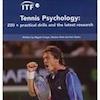Tennis Psychology - The foundation of Winning Tennis

|
It is based on general and sports psychology and then applied to tennis specifically.
There are many common elements in the psychology of tennis which can be found in other sports too.
An athlete that wants to perform at his peak needs to learn:
1. How to control his thinking
Negative thinking affects players much more than they are aware of. It affects body abilities in two ways - being aware of them (feeling tension) and being unaware (the pendulum experiment); moreover it evokes negative feelings - emotions that cloud the player's judgment and affect his body abilities - again.
By being more and more aware of what he is thinking a player can then change his thoughts to a more positive and solution based thinking. The awareness of our thoughts is quite a challenge in the tennis psychology approach.
2. How to control his arousal - to manage his intensity and body energy
A player's arousal can be too high or too low and in both cases he is not able to play his best tennis. Arousal affects his body and mind abilities - a player may have too much muscle tension and his decisions are usually not tactically intelligent.
Learning to find the "ideal state" is the key in controlling one's arousal and one of the most important aspects of tennis psychology.
3. What elements of the tennis game can a player control
A player may get upset (and it happens often) about an event that he cannot control or even influence. For example - the noise of the planes flying over the court, windy conditions, court conditions, his opponent's luck and so on.
By being focused on these events he wastes his energy which could be used on elements that he can control - his attitude and effort, how he intends to play, …
4. How to improve concentration
Many players start the match with good concentration but they drop their level of concentration because of disturbing outside events, pressure situations, emotional reactions to various events and so on. A player needs to learn how to quickly and effectively refocus to be able to play his best tennis.
Imagery or visualization is extremely useful in almost all aspects of the tennis game. A player can improve technique, strategy, physical abilities and his mental preparation of certain events. Another use of imagery is when a player misses a shot and then quickly sees in his mind how he hit the ball correctly. Using imagery is an incredibly efficient technique, not only in tennis sports psychology but in everyday life too.
Confidence is one of those elements where tennis psychology can help really quickly and with very simple tools. A player who is not confident will hesitate in his decisions, will be afraid to take risks and his shots will usually miss by just a little. Doubt can be seen in reality as small misses that happen regularly.
When a player builds his confidence he is able to play at his best and doesn't lose his hope when a big challenge appears.
7. How to find and get rid of limiting beliefs
Limiting beliefs are one of the most limiting and troublesome aspects of human's psyche. They are mostly deep in the subconsciousness and are sometimes hard to find. A limiting belief for example is when a player believes that he is not good in tie-breaks and he will then self-sabotage himself in those crucial moments to prove himself right.
Having no limiting beliefs means that the player is in total acceptance of everything that happens. Outside events are just events with no meaning. Tennis psychology helps the player to accept and deal with them.
8. How to empty the mind - Inner Game of tennis principles to enter the zone
There are three main principles of the Inner Game - quieting the mind, non-judgment and trusting the body. The player must first learn to apply them in training. And when he experiences these effects in training he knows what to look for in the match. He then plays the inner game - how to perform at his peak.
These are the fundaments of tennis psychology and by understanding these principles and applying them daily a player develops mental toughness. He knows how to apply the tools and as a very positive side effect gains a lot of self confidence.
He now knows that he has ways of dealing with his own mind and that most of his competitors do not. He is aware that he has the edge in the most stressful situations in the match and that gives him self confidence.
By constant application of these tools a player becomes more and more proficient with them and finds his ideal mental state very quickly if he happens to lose it. These losses of ideal state happen less and less often.

Courage - The Key Mental Skill Of Tennis Champions
Courage is rarely discussed or written about when it comes to sports psychology, and yet it is the key mental ability that separates winners from losers.
How To Improve Self-Confidence In Tennis
Most tennis players subsconsciously build a very fragile type of self confidence which vanishes as soon as things don't look that good. How can you build a stronger and permanent confidence?
How to Create 100% Belief in Yourself - The Path to Total Self-Confidence
Being certian of the outcome of a tennis mjatch is slightly out of touch with reality. But if you can adopt this kind of thinking, you'll play your best tennis.
How to Play Matches The Same Way As You Play In Practice
One of the biggest challenges for competitive tennis players is to play matches as well as they play in practice. Learn what kind of mental discipline is needed to achieve peak performance in matches...
2 Ways To Deal With The Lack of Confidence In Tennis
The usual approach to dealing with a lack of confidence is to build confidence through positive thinking and talking, positive body language and similar methods. However, as you will see, this helps only temporarily and the help is almost never permanent.
Tennis in the Zone - 10 Ways to Enter the Zone
Knowing the characteristics of the ideal mental state also called "the zone" allows us to work on them and increase the chances of entering the zone state.
Playing in the Zone - 5 More Tennis Drills To Help You Enter The Zone
Work on egoless play, breathing, playing point by point, believe in your abilities and enjoy the game of tennis...
Perfectionism In Tennis
Perfectionism can be beneficial or detrimental to your tennis game, depending on just how perfect you want to be.
Dealing with Choking in Tennis
You might not have heard of the expression "tennis choking", but if you've been playing tennis for a while you definitely know the feeling of tension and so-called "short arm".
Why Are There So Few Tennis Champions?
You've probably heard it said that the top-100 player hits the ball as well as the top-10 tennis champion. They are both fit and are both masters of tennis tactics, spins and strokes. The difference seems to be mental.
A Survival Instinct That Hurts Your Tennis
There is a survival instinct that stops you from giving your best. Learn what it is and how to overcome it...
ITF Tennis Psychology Book Review
ITF Tennis Psychology has helped me create very interesting and challenging tennis lessons for the players I coach, and they really enjoy practice sessions where we train for mental skills on court.
How to Maintain a High Level of Concentration during a Tennis Match
You've probably noticed that maintaining concentration through a whole tennis match is not easy. Most tennis players actually start a match highly focused, but then they get distracted or mentally tired and this results in lack of concentration.
How To Overcome The Fear Of Losing In Tennis
The fear of losing usually isn't the fear of losing a tennis match. Losing a tennis match is not a big deal. It means only that someone else played better than you.
The Courage to Win in Sports Ebook Review
The Courage to Win in Sports ebook can be downloaded for free and includes interesting mental exercises that will help you play your best tennis when you need to.
Expectations, Being Confident And No-Thought Approach
Sometimes when you expect you're going to be very good and over confident it turns out to your disadvantage and more modesty can be what the doctor orders. Do u agree with this line of thinking?
Why Do We Sometimes Suddenly Lose A Stroke?
A player with a very good shot suddenly loses it, and it becomes his nightmare. Why does this happen and what can we do to get the stroke back?
Two Mindsets for Tournament Tennis Players
I see two types of tennis mindsets in tournament players when it comes to their approach to playing points. A tennis mindset for success is the player who focuses on winning points and executing good shots.




